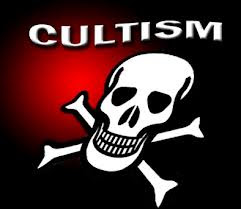By Femi Onasanya
The pathetic rise in cultism in Nigeria and its attendant destructive activities are a clear picture of the fact that things have indeed fallen apart. And the need to checkmate it is now more important than ever, before it gets out of hand.
Overtime, the activities of cult groups result in all sorts of hellish acts that include robbery, assassination, drugs and kidnapping.
To make the matter worse, the involvement of artisans, butchers, okada (commercial motorcycle) operators and pupils who lack moral upbringing at that tender age has put the society at greater risk. I remember quite well that during my childhood – in the late 1980s and early 1990s, many of the cult-related stories that we read in the media nowadays were hardly heard. Then, this menace, which government at all levels have consistently grappled with, was limited to mostly students of tertiary institutions. Until recently, cult group membership was not two a penny, contrary to the on-going dance of shame at the market square nowadays.
Cultism in Nigeria dates back to pre-colonial era when a group of people with the main aim of seeking protection from their ancestors conducted rituals. Secret cults have always existed in many parts of the country. The Ogboni Fraternity is notable among the Yoruba, Ekpe secret cult among the Efik, Ekine cult in the Delta region and Owegbe cult among the Edo.
Almost everywhere in the world, different types of secret groups are manipulated in the articulation of organisational functions for a variety of social and political purposes. These societies differ in what is kept secret and what is made public. In some, membership is secret, but the rituals are not, while in some others, membership is made public but rituals are secret.
Opaluwah A.B (2009), wrote in his book, Cultism and Nigerian Campuses, that “one positive thing about these societies is that they do not harm unless provoked and they could serve as an instrument for cleansing the society of any cultural debris.” The author argued that some even serve as agents of socialisation that initiate men and women into adulthood, as in Poro and Mende societies in Sierra Leone and the Oviaosese in Ogoniland.
Nigerian educational institutions were not associated with secret cults until 1952 when Prof. Wole Soyinka and six others, including Olumuyiwa Awe, Ralph Opara, Tunji Tubi, Daign Imokhuede, Pius Olegbe and Olu Agunloye, formed the Seadogs Confraternity, popularly called Pyrates. The ideas behind the formation of the confraternity were both patriotic and altruistic, as it was not intended as a secret cult. Its objectives were basically to fight non-violently but intellectually and effectively against the imposition of foreign conventions as well as revive the age of chivalry and finding a lasting solution to the problems of tribalism and elitism.
It is no news that Nigeria as a nation has too many nuts to crack. But things would have been much easier if cultism, which is the root of many social vices, had not eaten this deep into the fabrics of our society, affecting the younger generation. The insurgents who are threatening our existence, under the guise of Boko Haram, are mostly youths. Not forgetting the Niger Delta militants who are clamouring for resource control in the name of Movement for the Emancipation of Niger Delta (MEND) and the Igbo group, Movement for the Actualisation of the Sovereign State of Biafra (MASSOB), struggling for secession. They are also predominantly young.
Without mincing words, if this unwholesome growth in cult activities is not put in check, I can aptly say that Nigeria has a bleak future. How do you expect a brighter tomorrow when today’s leaders are busy with destructive activities and tendencies? As such, efforts to stem the tide of cultism should be totally collaborative. A Yoruba adage says, “to ensure that your eyes do not see evil, the whole body must be engaged”.
Parents should endeavour to be committed to parenting. Many parents have abandoned the role of children’s upbringing to babysitters, nannies and teachers. Teaching of morals, manners and the fear of God should be given emphasis in the home. Unfortunately, children spend more time in school than they do at home when parents, who should be their primary models, are far away at work or elsewhere. It is advisable that both parents should work hard to have a happy and stable marriage because children are always at the suffering end of any broken marriage.
Educational institutions should as well not fail to always remember that they award certificates based on character and learning. There is, therefore, no need of tolerating acts that will put the school in bad light. It is also expedient that teachers who are supposed to be custodians of morals should not fail to do so as they inculcate virtues in the young ones.
Our religious organisations should see this time as dangerous according to the Bible. Hence, the need to intensify preaching and teaching on topics that build the total man. What God hates should be clearly stated to all and sundry without ‘economising’ the truth for whatever reason. And it is good to “catch them young” because dried fish can hardly bend.
The place of the media in nation building is second to none. Gone were the days when television and radio programmes were centred on building character in children. The likes of ‘Tales by Moonlight’, ‘Speak Out’ among others were widely appreciated in those days.
With the change mantra of the President Muhammadu Buhari administration, government at all levels should not take it calm in the attempt to curb the menace of cultism. There should be laws that will ban all forms of cult activities and use of weapons among young ones in schools and the larger society. And whoever is caught flouting the law should be made to face the wrath of the law.
• Onasanya wrote in from Abeokuta, Ogun State.













